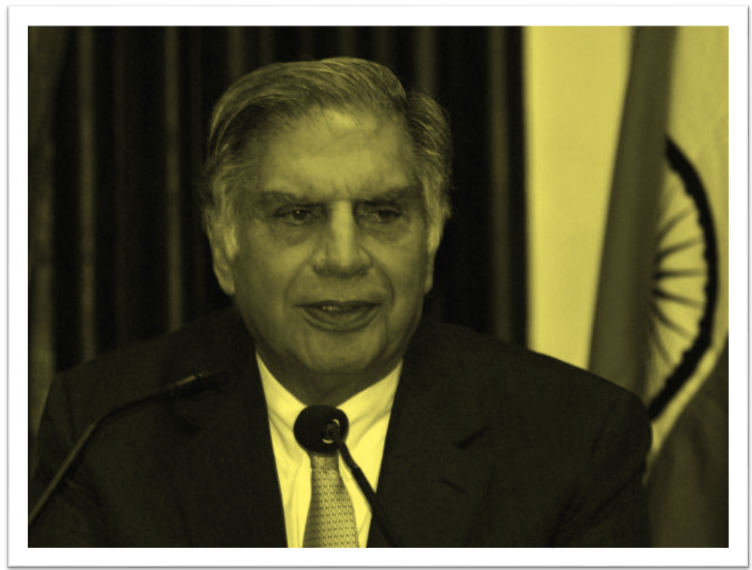The scion of one of the wealthiest families of India who would rise from working a simple Blue Collar job to heralding another Golden Period for the conglomerate as its head, Ratan Tata has revolutionized the Tata Group and taken it to a new high.
Ratan Tata is the son of Naval Tata who was adopted by Navajbai Tata from one of her distant relatives after her husband, Ratanji Tata passed away. Ratan Tata’s parents divorced when he was only 10 years old and his younger brother, Jimmy, 7 and even both of them were raised by their grandmother. Ratan Tata also has a stepbrother from his father’s second marriage, Noel.
After completing his schooling in Mumbai, Ratan Tata completed his graduation from the Cornell University in the USA in Architecture with Structural Engineering in 1962. Ratan Tata then went on to complete the Advanced Management Program from the Harvard University in 1975.
Ratan Tata began his career in the Tata Group in 1961. Despite being a Tata himself and having studied around the world, he wasn’t given any key position straightaway, and started on the Shop Floor of Tata Steel, shoveling Limestone and having to deal with the Blast Furnace. It was only 30 years later, that J.R.D. Tata stepped down as the Chairman of Tata Sons and crowned Ratan Tata as his successor.
As an administrator, one of Ratan Tata’s biggest accomplishments was the consolidation of the Tata Groups against Predatory Companies. Prior to his taking over the reigns, the Tata Sons which is the holding company had shares in single digits in the Individual Companies of the Tata Group. After assuming the role of chairman, he quickly acquired Stake from the market and strengthened the position of the Holding Company in Tata Group. Another striking difference between Ratan Tata and his predecessor was the sheer ruthlessness in dealing with the personal fiefdoms which had emerged in Tata Groups as a result of J. R. D. Tata’s leniency. He quickly removed these mini kings from their thrones and installed his own men who would work for him and established his authority in the ranks. Ratan Tata’s love for a Chairman who could assert his authority in the company also shows in his choice of a successor. He chose Cyrus Mistry over Noel Tata, contrary to popular expectations, because Noel could have been too soft for Ratan’s liking.
Under Ratan Tata’s management, the Tata Group which had so far been India-Centric blossomed into a Global Force with 65% of its revenue coming from abroad. Under his visionary leadership, Tata Tea acquired Tetley from the Tetley Group in 2000, making Tata Global Beverages the second largest producer of Tea in the world after Unilever. Also, under him, Tata Motors acquired the legendary Jaguar Land Rover and Tata Steel acquired Corus, the second largest Steel Maker in Europe. Under his able leadership, the revenues of the Conglomerate grew manifold, totaling over a $100 billion in 2011-12.
Ratan Tata announced his retirement on the 28th of December, 2012, on his 75th Birthday. But the great man continues to work in spite of his retirement. He has made small investments in various Startups such as Snapdeal, Ola Cabs and Paytm. In April, 2015, reports said Ratan Tata had acquired a stake in the Chinese Smartphone Startup, Xiaomi on undisclosed terms.
Ratan Tata has been awarded with numerous awards for his remarkable tenure as the Chairman of the Tata Group and his Philanthropy. He was awarded the Padma Bhushan in 2000 by the Government of India and the Padma Vibhushan in 2008, the third and second highest Civilian Awards in the Country. Apart from the awards, he also serves as a member of the Prime Minister’s Council on Trade and Industry and the National Manufacturing Competitiveness Council.
The Tatas are renowned for their work in Philanthropy and their contribution to Scientific Research and development. The Tata Group was awarded the Carnegie Medal of Philanthropy in 2007. The Tata Institute of Social Sciences (TISS) and the Tata Institute of Fundamental Research (TIFS) are only two of the Institutes established by the Tata Group to promote Scientific Research and Work.
However, the true greatness of the man was revealed in the aftermath of one of the darkest tragedies in Indian History, the Mumbai Attacks. The salaries of the employees were paid even though the Taj Hotel was closed for reconstruction. The families of the Employees affected were flown in to Mumbai and provided free education for 3 weeks. About 1600 employees were provided with Food and all other necessities through the Employee Outreach Centers. Ratan Tata even paid them a personal visit. Tata covered the compensation for the Railway Employees, Police Staff and Pedestrians. The vendors and the shop owners were provided with Medical Assistance as well. And if all of this was not enough, Tata established a Psychiatric Institution with the Tata Group of Social Science to counsel those suffering from Trauma. He then went on to grant the education of 46 children of the victim of the Terrorist Attack.
Carrying on the legacy of Sir Ratanji Tata, Ratan Tata performed an admirable job of fulfilling his responsibility towards the Tata Group and taking it to new heights. He continued the glorious tradition of the Tatas of promoting and financing Scientific Research in the country and lent support to the observation that Innovation is undeniably linked with Capitalism. On behalf of the entire team of TFI, I wish the Great “Capitalist”, a very Happy Birthday.
